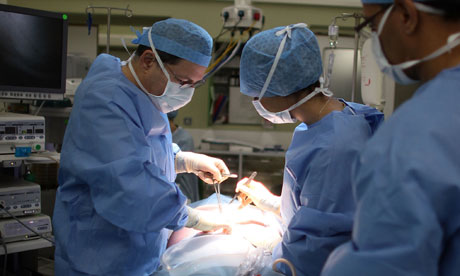
In the past few days we have learned of women who have had breast prostheses inserted, only to discover now that their implants contain industrial silicone which might imperil their health if leaks or ruptures occur, as happens occasionally to silicone implants. The contents were not accredited as safe for internal use; they were manufactured with industrial silicone because medical silicone is much more expensive. In other words a dangerous substitution was made to increase suppliers' profits.
This raises some interesting questions. One relates to the relationship of private medicine to public healthcare provision. In this case, the manufacturer should clearly not have marketed prostheses containing industrial silicone, but in 2010 that company ceased to trade, so no recompense can be sought from it. Most of the surgeons paid to implant the substandard products are probably still in business. If they did not know that the PIP implants were inappropriate, then perhaps they should have known. Under contract law they are responsible for the suitability of their materials. Some of these companies are allegedly using "commercial confidentiality" to withhold explanations; astonishingly, a few are trying to charge each woman £50 for information from her medical file.
Although the British Association of Plastic, Reconstructive and Aesthetic Surgeons suggests removal of the implants, Andrew Lansley has played down the risk of ruptures. A debate about whether the NHS should fund removals has followed the French government's decision to do so. In that case, the NHS would be left to pay for the errors of private cosmetic surgeons. This is inevitable as private surgery providers rarely have the medical support facilities to deal with life-endangering crises resulting from botched surgery, but there is no standard mechanism to recoup the resulting costs to the NHS.
Interestingly, providers known to have used these implants include private equity-funded Spire Healthcare, and BMI Hospitals (owned by South African Netcare). According to the investigative journalists at Spinwatch, these companies are among those that have been aggressively lobbying MPs for NHS funding to provide services in competition with NHS facilities. Their lobbying efforts are near fruition, and an influx of private providers into NHS provision is imminent.
Simultaneously, recent budgetary constraints are resulting in patients being told they must seek private providers for procedures previously covered by the NHS. Thus more companies will be paid for conducting procedures, while lacking the capacity to cope when things go badly wrong. Their profit-making status incentivises minimising costs by any means available. However, the health and social care bill now in the Lords contains no provision to penalise providers who deliver inferior services that generate costs for other providers or cause harm to patients. In a highly competitive market, provider failure is more likely, and an appropriate procedure to address the consequences is lacking.
The impending removal of legal aid in clinical negligence cases indicates that the risks to patients of such occurrences are not taken seriously by the government; neither does the imposition this year of restrictions on "no-win no-fee" legal representation. The bill provides no legal mechanisms to ensure that private providers cannot dump patients damaged by their errors on to NHS hospitals and escape without penalty. There are not even robust requirements for providers to have adequate insurance to cover this sort of situation when the provider has ceased trading.
It's worth noting that the passage of the bill will allow the secretary of state for health to wash his hands of any future events of this kind. There will no longer be any redress for medical errors except through the courts, and then only for those who can pay a legal team to pursue their case.
• Follow Comment is free on Twitter @commentisfree

